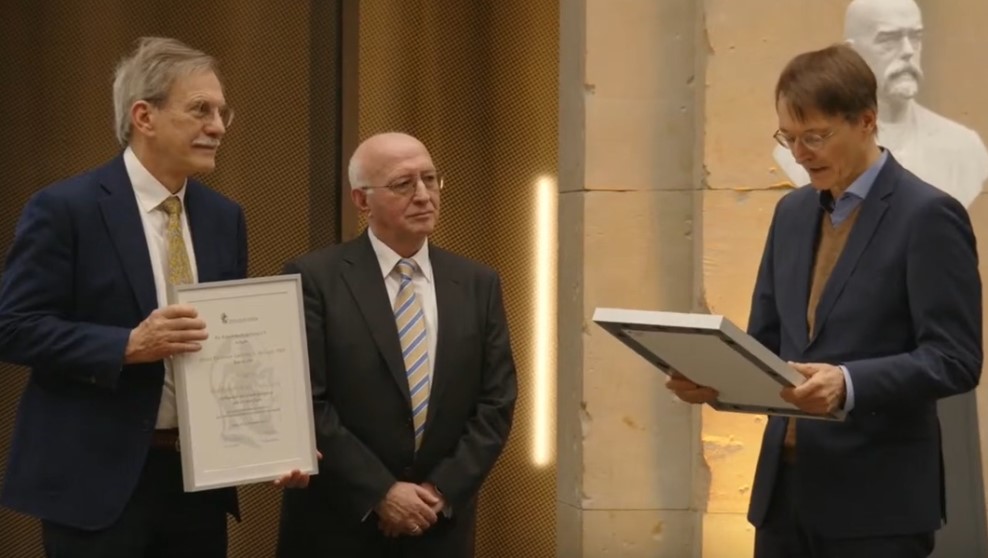Dr. Francisco Sánchez-Madrid awarded the 2023 Robert Koch Prize
This work is of fundamental importance for understanding the immune system and its reactions
Dr. Francisco Sánchez-Madrid, head of the Intercellular Communication in the Inflammatory Response group at the National Center for Cardiovascular Research (CNIC), Chief of the Immunology Service at La Princesa University Hospital, director of the La Princesa Health Research Institute (IIS Princesa), and Professor of Immunology at the Autonomous University of Madrid, has been awarded the 2023 Robert Koch Prize alongside researcher Timothy Springer for their significant collaborative research in Immunology. Both were pioneers in discovering the relevance of cell adhesion molecules in the function of immune cells. This groundbreaking finding has opened up new possibilities for treating immune-related diseases through monoclonal antibodies.
The Robert Koch Prize 2023 will be awarded to Timothy Springer and Francisco Sanchez-Madrid. Together and as the first to do so, they have demonstrated the importance of cell adhesion molecules for the function of immune cells and have created new possibilities for the treatment of immune diseases with monoclonal antibodies against such molecules. Patrice Courvalin, one of the world's most renowned researchers in the field of antibiotic resistance, will receive the Robert Koch Gold Medal for his life's work.
"With this year's prizewinners, we are honouring two world-famous pioneers of immunology," says Prof. Dr. Wolfgang Plischke, Chairman of the Robert Koch Foundation. "In the pandemic of the last few years, autoimmune diseases have slowly moved more into the focus of public interest - yet scientists have been researching in this field for decades. With this year's Robert Koch Prize, we want to draw special attention to the out-standing work in immunology. With the lifetime achievement award, we are also showing that the importance of antibiotic resistance research continues to develop undiminished.
As Chairman of the Scientific Advisory Board of the Robert Koch Foundation, Prof. Dr. Andreas Radbruch adds: "Tim Springer and Francisco Sanches-Madrid have done pioneering work in researching the proteins that immune cells use to dock with other cells. These proteins are of central importance for the function of immune cells. Only in this way can immune cells protect us during infections, for example by killing virus-infected cells. Diseases caused by misdirected immune reactions, e.g. autoimmune diseases, can be treated by blocking these adhesion molecules. Here, the prize winners have developed the first monoclonal anti-bodies, which are now used as drugs. Patrice Courvalin has dedicated his life's work to researching bacterial resistance to antibiotics. With him, we honour a researcher who has significantly shaped this field of eminent practical importance over the past decades.".
Francisco Sanchez-Madrid is a Spanish immunologist. He received his PhD from the Universidad Autónoma de Madrid in 1980. He then worked for several years at the Department of Pathology at Harvard Medical School in Boston, Massachusetts, USA. Together with Timothy Springer, he identified integrins that control the adhesion, polarity and activation of leukocytes and thus made a decisive contribution to the development of therapies for multiple sclerosis and Crohn's disease. Since 1990, he has been Professor of Immunology at the Universidad Autónoma de Madrid. His further research has made a decisive contribution to understanding the function of immunological synapses, i.e. the structures with which immune cells communicate with each other or with other cells.
Timothy Alan Springer is an American immunologist and professor at Harvard University, Boston, Massachusetts, USA. He comes from Fort Benning, Georgia, and studied biochemistry in Berkeley at the University of California before receiving his doctorate from Harvard in 1976. He has been a professor at Harvard Medical School since 1977. Together with Francisco Sanchez-Madrid, he discovered integrins, proteins that connect cells and are crucial for the function of these cells, such as the migration of cells from the blood into the tissue, as he was able to show for the first time. Monoclonal antibodies developed by them against certain integrins proved to be effective against chronic inflammations. For example, in multiple sclerosis and inflammatory bowel diseases. Today, he is interested in the question of how integrins and other adhesion molecules are activated for binding, and how a "synapse" between two cells is created in this way.
This work is of fundamental importance for understanding the immune system and its reactions. Timothy Springer and Francisco Sanchez-Madrid will be jointly awarded the Robert Koch Prize 2023, which is endowed with 120,000 euros. The Nobel Laureate Professor Jules Hoffmann will give the laudation.











